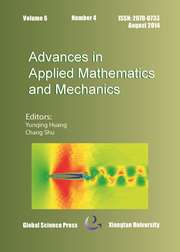Crossref Citations
This article has been cited by the following publications. This list is generated based on data provided by
Crossref.
Daniel, Yahaya Shagaiya
Aziz, Zainal Abdul
Ismail, Zuhaila
and
Salah, Faisal
2017.
Double stratification effects on unsteady electrical MHD mixed convection flow of nanofluid with viscous dissipation and Joule heating.
Journal of Applied Research and Technology,
Vol. 15,
Issue. 5,
p.
464.
Hussain, S.
Ahmed, Sameh E.
and
Akbar, T.
2017.
Entropy generation analysis in MHD mixed convection of hybrid nanofluid in an open cavity with a horizontal channel containing an adiabatic obstacle.
International Journal of Heat and Mass Transfer,
Vol. 114,
Issue. ,
p.
1054.
Hussain, Shafqat
Ahmed, Sameh E.
and
Saleem, Farrukh
2018.
Impact of Periodic Magnetic Field on Entropy Generation and Mixed Convection.
Journal of Thermophysics and Heat Transfer,
Vol. 32,
Issue. 4,
p.
999.
Sheikholeslami, M.
and
Vajravelu, K.
2018.
Lattice Boltzmann method for nanofluid flow in a porous cavity with heat sources and magnetic field.
Chinese Journal of Physics,
Vol. 56,
Issue. 4,
p.
1578.
Shakunthala, S.
and
Nandeppanavar , M.M.
2019.
Boundary Layer Flow and Cattaneo-Christov Heat Flux of a Nonlinear Stretching Sheet with a Suspended CNT.
Nanoscience & Nanotechnology-Asia,
Vol. 9,
Issue. 4,
p.
494.
Mishra, M. K.
Seth, G. S.
and
Sharma, R.
2019.
Navier’s Slip Effect on Mixed Convection Flow of Non-Newtonian Nanofluid: Buongiorno’s Model with Passive Control Approach.
International Journal of Applied and Computational Mathematics,
Vol. 5,
Issue. 4,
Gupta, Sumit
Kumar, Devendra
and
Singh, Jagdev
2019.
Magnetohydrodynamic three-dimensional boundary layer flow and heat transfer of water-driven copper and alumina nanoparticles induced by convective conditions.
International Journal of Modern Physics B,
Vol. 33,
Issue. 26,
p.
1950307.
Aghbari, Anis
Ali Agha, Hamza
Sadaoui, D.
and
Mouloud, Smail
2019.
Soret and Dufour’s Effect on Non-Darcy Natural Convection Flow of Buongiorno Nanofluid over a Vertical Plate in a Porous Medium in the Presence of Viscous Dissipation.
Defect and Diffusion Forum,
Vol. 392,
Issue. ,
p.
60.
Atlas, M.
Hussain, S.
and
Sagheer, M.
2019.
Entropy generation and unsteady Casson fluid flow squeezing between two parallel plates subject to Cattaneo-Christov heat and mass flux.
The European Physical Journal Plus,
Vol. 134,
Issue. 1,
Atif, S. M.
Hussain, S.
and
Sagheer, M.
2019.
Effect of viscous dissipation and Joule heating on MHD radiative tangent hyperbolic nanofluid with convective and slip conditions.
Journal of the Brazilian Society of Mechanical Sciences and Engineering,
Vol. 41,
Issue. 4,
Mjankwi, Musa Antidius
Masanja, Verdiana Grace
Mureithi, Eunice W.
and
James, Makungu Ng’oga
2019.
Unsteady MHD Flow of Nanofluid with Variable Properties over a Stretching Sheet in the Presence of Thermal Radiation and Chemical Reaction.
International Journal of Mathematics and Mathematical Sciences,
Vol. 2019,
Issue. ,
p.
1.
Khoshrouye Ghiasi, Emran
and
Saleh, Reza
2019.
Thermophysical Investigation of Unsteady Casson–Carreau Fluid.
INAE Letters,
Vol. 4,
Issue. 4,
p.
227.
Waini, Iskandar
Ishak, Anuar
and
Pop, Ioan
2019.
Hybrid nanofluid flow and heat transfer over a nonlinear permeable stretching/shrinking surface.
International Journal of Numerical Methods for Heat & Fluid Flow,
Vol. 29,
Issue. 9,
p.
3110.
Gupta, Sumit
Kumar, Devendra
Singh, Jagdev
and
Gupta, Sandeep
2019.
Impact of generalized Fourier’s law and Fick’s law for MHD flow of Ag‒H2O and TiO2‒H2O nanomaterials.
Multidiscipline Modeling in Materials and Structures,
Vol. 15,
Issue. 6,
p.
1075.
Hussain, Shafqat
and
Ahmed, Sameh E.
2019.
Unsteady MHD forced convection over a backward facing step including a rotating cylinder utilizing Fe3O4-water ferrofluid.
Journal of Magnetism and Magnetic Materials,
Vol. 484,
Issue. ,
p.
356.
Atif, S.M.
Hussain, S.
and
Sagheer, M.
2019.
Heat and mass transfer analysis of time-dependent tangent hyperbolic nanofluid flow past a wedge.
Physics Letters A,
Vol. 383,
Issue. 11,
p.
1187.
Nimmagadda, Rajesh
Reuven, Rony
Asirvatham, Lazarus Godson
and
Wongwises, Somchai
2020.
Thermal Management of Electronic Devices Using Gold and Carbon Nanofluids in a Lid-Driven Square Cavity Under the Effect of Variety of Magnetic Fields.
IEEE Transactions on Components, Packaging and Manufacturing Technology,
Vol. 10,
Issue. 11,
p.
1868.
Amoo, O.M.
Oyewola, M.O.
and
Fagbenle, R.O.
2020.
Application of the finite-element method to the solution of nonsimilar boundary layer-derived infinite series equations.
International Journal of Heat and Mass Transfer,
Vol. 161,
Issue. ,
p.
120244.
Reddy, P. Sudarsana
and
Sreedevi, P.
2020.
MHD boundary layer heat and mass transfer flow of nanofluid through porous media over inclined plate with chemical reaction.
Multidiscipline Modeling in Materials and Structures,
Vol. 17,
Issue. 2,
p.
317.
Reza-E-Rabbi, Sk.
Ahmmed, Sarder Firoz
Arifuzzaman, S.M.
Sarkar, Tanmoy
and
Khan, Md. Shakhaoath
2020.
Computational modelling of multiphase fluid flow behaviour over a stretching sheet in the presence of nanoparticles.
Engineering Science and Technology, an International Journal,
Vol. 23,
Issue. 3,
p.
605.

